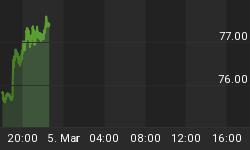Last week's gathering in London of the leaders of the 20 foremost economic countries in the world had been billed as the most important global financial meeting in more than 60 years. The stage had been set for hotly contested economic policies to be hashed out with the intensity of a Cold War arms negotiation. However, for most observers, the results of the G-20 failed to live up to the billing. Other than a masterful display of haute couture by the new American first lady, there are few results that anyone can really call significant.
But for those with a keen eye for the subtleties of diplomacy-speak and an understanding of the true dangers that face the global economy, the G-20 communiqué had much to say; none of it promising. For those hoping that the participants would move to restore sound money, allow the global financial system to undergo a badly needed deleveraging, and seek to restructure the American economy in a way that is sustainable, the communiqué was a complete disappointment.
From the outset, the public pronouncements of some important participants led observers to believe that the G-20 meetings would prove acrimonious and strained, with rare public splits emerging over macro-economic policy. But as the meeting got down to brass tacks, the participants seemed to emphasize photo ops with big smiles and confidence-building comments. It looked like a great success for host Prime Minister Gordon Brown, who claimed the emergence of a "new world order".
But was the reality behind all the smiles, thumbs up and hugs? Today, the world stands at a crucial crossroads in deciding how to deal with a severe debt-based recession that threatens a world depression. It therefore appears somewhat strange that the G-20 packed so much goodwill and agreement into such a short space of time.
In the build up to the G-20 meetings, much publicity was given to a major split between the German-led European Union (EU) and the United States and United Kingdom, or "Anglo Saxons" as French President Nicholas Sarkozy calls them. The leaders of the EU disagree fundamentally with the logic of seeking to solve a chronic debt problem with the application of yet more debt. Indeed, the current President of the EU publicly described the U.S. Administration's stimulus-and-bailout policy as "the road to hell"! Though the leaders surely discussed these issues at length, the final communiqué actively sought to conceal any sign of discord.
Another key issue that was papered over was the call led by China for the introduction of a new world 'reserve' currency to replace the depreciated U.S. dollar. However, clause 19 of the G-20 communiqué did authorize the IMF to create $250 billion of new 'magic' money by way of Special Drawing Rights (SDR's). This opens the way to a new world currency and more international inflation. Meanwhile, the door was left open for the "Anglo Saxons" to continue to force their taxpayers and all holders of their currencies to finance the profligate spending of their governments.
On the subject of maintaining free trade, many 'non-committal commitments' were given, leaving the field open for continued protective trade barriers and competitive currency devaluations, which will likely both deepen and lengthen any depression. Economists have long credited the Smoot-Hawley Tariff of 1930 with initiating a global wave of protectionism which doomed any hope for a quick recovery from the Great Depression. Given the far greater interdependence of today's world economy, the consequences of a modern trade war would be even more devastating. Scaling back the advantages of global specialization would drastically lower living standards around the world, particularly in the Unites States.
With that threat looming, the Obama Administration appears still to be persuaded to keep the walking dead (Citi, GM and AIG etc) on citizen-financed life support. Yet, there was no rebuke from G-20 leaders, many of whom lead countries that had formerly been pilloried by the U.S. for economic nationalism. Why not hold the U.S. to its own standard? What should make the Obama Administration's bailouts so offensive to foreign leaders is that their own citizens will be asked to pay for it! It's one thing for France to subsidize Airbus to put Boeing at a disadvantage; it's quite another thing for America to subsidize Boeing with France's money. In this respect, the meeting's lack of open conflict was surprising.
With no rancor anywhere on display, the U.S. stock market rallied in the mistaken belief that a more healthy "new world order" had been established. Smiles are nice, and hugs are grand, but fundamentals pay the bills for investors. The G-20 meeting showed no evidence of reform. If anything, it showed that the trends which we have been following are only going to intensify.
For a more in-depth analysis of our financial problems and the inherent dangers they pose for the U.S. economy and U.S. dollar, read Peter Schiff's newest book "The Little Book of Bull Moves in Bear Markets." Click here to order your copy now.
For a look back at how Peter predicted our current problems read the 2007 bestseller "Crash Proof: How to Profit from the Coming Economic Collapse." Click here to order a copy today.
More importantly, don't wait for reality to set in. Protect your wealth and preserve your purchasing power before it's too late. Discover the best way to buy gold at www.goldyoucanfold.com. Download Euro Pacific's free Special Report, "Peter Schiff's Five Favorite Investment Choices for the Next Five Years", at http://www.europac.net/report/index_fivefavorites.asp. Subscribe to our free, on-line investment newsletter, "The Global Investor" at http://www.europac.net/newsletter/newsletter.asp. And now watch the latest episode of Peter's new video blog, "The Schiff Report", at http://www.europac.net/videoblog.asp.















